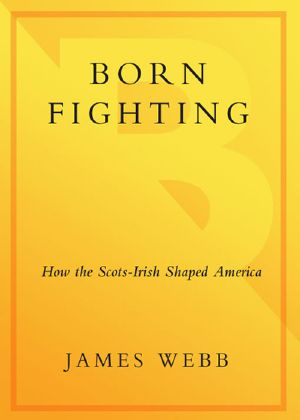Born Fighting

- Authors
- Webb, James
- Publisher
- Broadway Books
- Tags
- fiction , biography , history , politics
- ISBN
- 9780767922951
- Date
- 2004-01-01T00:00:00+00:00
- Size
- 0.51 MB
- Lang
- en
More than 27 million Americans today can trace their lineage to the Scots, whose bloodline was stained by centuries of continuous warfare along the border between England and Scotland, and later in the bitter settlements of England's Ulster Plantation in Northern Ireland.
When hundreds of thousands of Scots-Irish migrated to America in the eighteenth century, they brought with them not only long experience as rebels and outcasts but also unparalleled skills as frontiersmen and guerrilla fighters. Their cultural identity reflected acute individualism, dislike of aristocracy and a military tradition; and, over time, the Scots-Irish defined the attitudes and values of the military, of working-class America and even of the peculiarly populist form of American democracy itself.
*Born Fighting* is the first book to chronicle the epic journey of this remarkable ethnic group and the profound but unrecognised role it has played in shaping the social, political and cultural landscape of America from its beginnings through to the present day.
**
### From Publishers Weekly
Former navy secretary Webb (*Fields of Fire*; etc.) wants not only to offer a history of the Scots-Irish but to redeem them from their redneck, hillbilly stereotype and place them at the center of American history and culture. As Webb relates, the Scots-Irish first emigrated to the U.S., 200,000 to 400,000 strong, in four waves during the 18th century, settling primarily in Appalachia before spreading west and south. Webb's thesis is that the Scots-Irish, with their rugged individualism, warrior culture built on extended familial groups (the "kind of people who would die in place rather than retreat") and an instinctive mistrust of authority, created an American culture that mirrors these traits. Webb has a genuine flair for describing the battles the Scots-Irish fought during their history, but his analysis of their role in America's social and political history is, ironically for someone trying to crush stereotypes, fixated on what he sees, in almost Manichaean terms, as a class conflict between the Scots-Irish and America's "paternalistic Ivy League-centered, media-connected, politically correct power centers." He even excuses resistance to the "Northern-dominated" Civil Rights movement. Another glaring weakness is the virtual absence of women from the sociological narrative. Webb interweaves his own Scots-Irish family history throughout the book with some success, but by and large his writing and analysis are overwhelmed by romanticism.
Copyright © Reed Business Information, a division of Reed Elsevier Inc. All rights reserved.
### From Booklist
*Starred Review* In telling the story of the Scots-Irish in America as a robust and passionate tale, novelist Webb writes straightforward, no-nonsense, readable history that clips right along while it is also very personal and highly idiosyncratic about a people who, he claims, are largely invisible--taken for granted--to the general public and who, seldom thinking of themselves in ethnic identity terms, mostly don't know their culture. Webb maintains that Scots-Irish attitudes form the bedrock of American society, especially among the working class. Scots-Irish culture has produced American presidents from Andrew Jackson to Bill Clinton, soldiers from Ulysses S. Grant to George Patton, pioneers, preachers, and others whose most common characteristics may be described as fierce individualism, persistent egalitarianism, and a strong sense of personal honor. Perhaps the most visible examples of broad and ongoing Scots-Irish legacy are the fundamentalist Christianity (a potent combination of Scottish Calvinism and headstrong populism) of America's Bible Belt and country music. Webb begins the Scots-Irish saga in Scotland, where, he says, the Scots-Irish character was formed, moves on to the Ulster Scots of what is now Northern Ireland, and follows them to the Appalachians and points beyond as well as through the American Revolution, the Civil War, and up to the present day. Popular history at its finest. *June Sawyers*
*Copyright © American Library Association. All rights reserved*